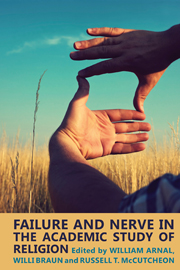Book contents
- Frontmatter
- Content
- Preface
- Acknowledgments
- Contributors
- Epigraph
- The Nerve of Donald Wiebe
- The Failure of Nerve in the Academic Study of Religion
- General Failures
- Special Failures
- Failures (of Nerve?) in the Study of Islamic Origins
- The Failure of Islamic Studies Post-9/11: A Contextualization and Analysis
- Religious Studies that Really Schmecks: Introducing Food to the Academic Study of Religion
- Cultural Anthropology and Corinthian Food Fights: Structure and History in the Lord's Dinner
- The Identity of Q in the First Century: Reproducing a Theological Narrative
- The Failure of Nerve to Recognize Violence in Early Christianity: The Case of the Parable of the Assassin
- Redescribing Iconoclasm: Holey Frescoes and Identity Formation
- In Lieu of Conclusion
- Index of Authors
Religious Studies that Really Schmecks: Introducing Food to the Academic Study of Religion
from Special Failures
- Frontmatter
- Content
- Preface
- Acknowledgments
- Contributors
- Epigraph
- The Nerve of Donald Wiebe
- The Failure of Nerve in the Academic Study of Religion
- General Failures
- Special Failures
- Failures (of Nerve?) in the Study of Islamic Origins
- The Failure of Islamic Studies Post-9/11: A Contextualization and Analysis
- Religious Studies that Really Schmecks: Introducing Food to the Academic Study of Religion
- Cultural Anthropology and Corinthian Food Fights: Structure and History in the Lord's Dinner
- The Identity of Q in the First Century: Reproducing a Theological Narrative
- The Failure of Nerve to Recognize Violence in Early Christianity: The Case of the Parable of the Assassin
- Redescribing Iconoclasm: Holey Frescoes and Identity Formation
- In Lieu of Conclusion
- Index of Authors
Summary
There is a measure of irony in what follows. In honoring a scholar who is renowned for his razor-sharp mind, his command of the literature, and the dispassionate nature of his prose, I am offering something here that is more personal and less rigorous. I suspect that Don Wiebe will not be surprised. We have known each other now for over a quarter century, and my predilections have not escaped him.
As readers of this volume well know, over the years Don has been interested more in how we study and teach about religion than in what we study. Study, if you will, Christian theology, he says, or Wiccan rituals, or Buddhist sacred texts, but conduct the research as an entomologist might study the mating practices of praying mantes: gather all the data, be in conversation with other researchers across the world, and publish the results in quality peer-reviewed sources. Other approaches to the study of religion, for example by insiders to further their own beliefs or conversely by outsiders to ridicule religion, have their place, but not in secular universities—and certainly not within the academic study of religion that ought to be dedicated to the scientific examination of religion as a fully human phenomenon.
Don has also insisted that researchers stay true to the discipline when they teach about religion and the study of religion in the classroom.
- Type
- Chapter
- Information
- Failure and Nerve in the Academic Study of Religion , pp. 147 - 156Publisher: Acumen PublishingPrint publication year: 2012



